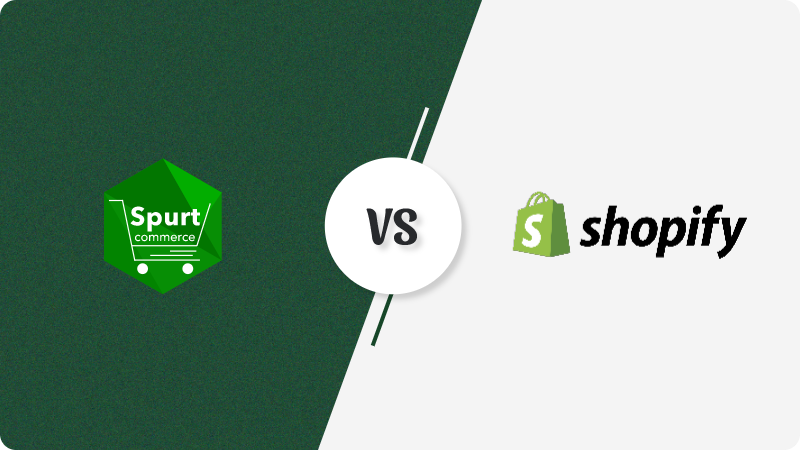COMPARISON
Spurtcommerce vs Shopify

A Practical Comparison for Modern E-commerce Development
Overview
This comparison highlights the key differences between Spurtcommerce and Shopify, two popular e-commerce platforms with very different approaches. While Shopify is widely known for its easy-to-use hosted solution, Spurtcommerce offers full control, flexibility, and built-in multi-vendor marketplace capabilities. This overview explains which platform suits different business needs based on features, customization, deployment and scalability.
About Spurtcommerce
Spurtcommerce is an open-source, Node.js-based e-commerce platform built on Express.js with a modern, API-driven, headless architecture. It supports both monolithic and microservices deployments and includes ready-made storefronts built with Angular, React (Next.js) and Flutter for mobile apps.
Spurtcommerce is designed for businesses seeking full source code access, extensive customization flexibility, and native multi-vendor marketplace features including seller panels and commission management. The platform focuses on B2C commerce with support for multilingual, multi-currency, promotions and rich storefront experiences.
About Shopify
Shopify is a leading hosted SaaS e-commerce platform known for simplicity and an extensive app ecosystem. It provides merchants with an all-in-one solution including storefront themes, payment processing and an admin dashboard. Shopify enables businesses to quickly launch single-vendor online stores with minimal technical expertise. However,
Shopify’s backend is proprietary and closed-source, which limits deep customization. Multi-vendor marketplace features require third-party apps or custom development and businesses rely heavily on Shopify’s hosted infrastructure and recurring subscription fees.
Key Differences – Spurtcommerce vs Shopify
| Feature/Aspect | Spurtcommerce | Shopify |
|---|---|---|
| Source Code Access | Full access and ownership of entire codebase, enabling deep customization and control | Closed SaaS platform, no backend source code access |
| Multi-Vendor Marketplace | Built-in multi-vendor marketplace support with seller panels, commission management and vendor features | Primarily single-vendor; multi-vendor needs expensive third-party apps or custom dev |
| Deployment Flexibility | Choice of monolithic or microservices deployment on own infrastructure or cloud | Fully hosted, no control over deployment or infrastructure |
| Cost Model | One-time enterprise license fee; no ongoing platform subscription or app charges | Recurring monthly subscription fees plus extra costs for apps |
| Vendor Lock-in | No lock-in; freedom to migrate, scale, or customize freely | Locked into Shopify’s ecosystem, making migration time consuming and costly |
| Mobile Apps | Flutter-based native mobile apps for storefront and sellers included in enterprise version | Limited mobile options; rely on Shopify’s official apps or third-party solutions |
| Technology Stack | Uses popular Express.js, Angular, React, and Flutter, friendly for modern MERN/MEAN developers | Uses proprietary Liquid templating, limited frontend flexibility |
| Complex Business | Supports B2B, B2C, marketplace | Basic B2C focus; advanced |
| Features | workflows including quotations, returns, multi-language and multi-currency natively | workflows require apps or custom development |
| Add-ons & Extensions | Wide range of built-in add-ons like SEO, chat, supplier management, support ticketing with full control | Extensive app store but apps are third-party, with limited backend integration |
| Customization Effort | Moderate effort with full code access, enabling fast custom feature development | Low for simple stores but higher for complex customizations due to API limits |
| Time to Market | Fast launch with ready-made UI, APIs, marketplace & mobile modules | Very fast for simple B2C stores; slower and costlier when building multi-vendor setups |
Spurtcommerce is ideal for:
- Businesses seeking full ownership and control of the e-commerce platform with access to source code.
- Companies requiring turnkey multi-vendor marketplace capabilities with built-in seller and commission management.
- Enterprises focused on B2C commerce with multilingual, multi-currency, promotions and product variant support.
- Development teams experienced with modern JavaScript frameworks such as Angular, React and Flutter.
- Organizations preferring flexible deployment options on own infrastructure or cloud.
- Brands aiming to build customized mobile apps included as part of the enterprise offering.
Shopify is ideal for:
- Small to medium businesses needing a quick, easy-to-launch online store without heavy technical involvement.
- Merchants seeking a fully managed SaaS platform with hosting, security and updates handled by Shopify.
- Companies focused mainly on single-vendor B2C retail sales with standard eCommerce needs.
- Users preferring a large marketplace of third-party apps and integrations for added features.
- Businesses accepting recurring subscription costs in exchange for simplicity and convenience.
- Store owners comfortable working within Shopify’s theme system and API limitations.
Conclusion
While Shopify remains a top choice for many businesses due to its ease of use and popularity, Spurtcommerce offers significant advantages for companies needing deeper control, flexibility and native multi-vendor marketplace capabilities.
Spurtcommerce’s open architecture, built-in seller management and source code ownership make it a powerful platform for businesses looking to scale, customize extensively, or operate complex B2C commerce models.
For organizations aiming to own the platform, support multiple sellers natively and develop custom mobile apps without vendor lock-in, Spurtcommerce presents a compelling alternative to Shopify.



 En
En Es
Es Ar
Ar